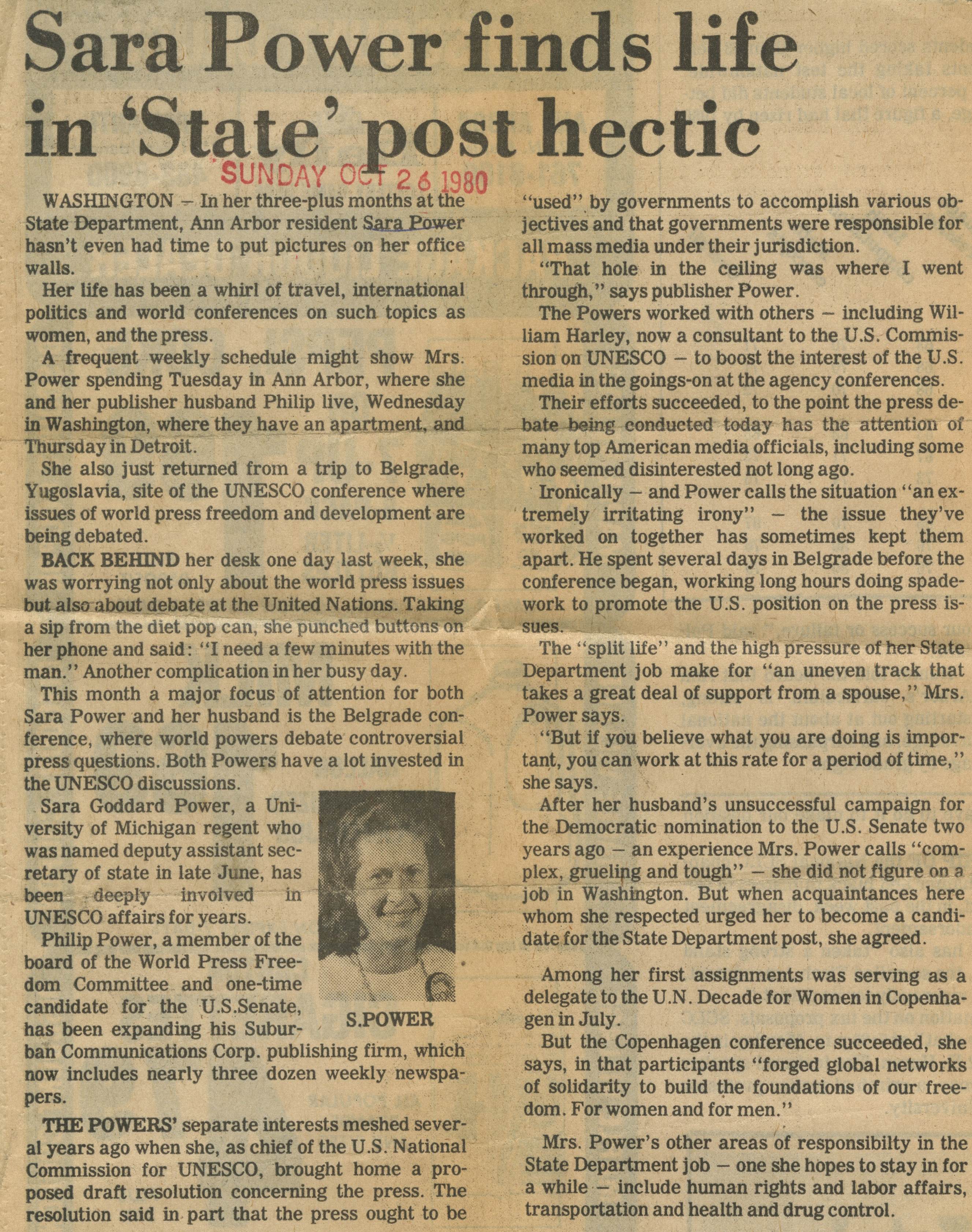Sarah Power Finds Life In 'State' Post Hectic

WASHINGTON - In her three-plus months at the State Department, Ann Arbor resident Sara Power hasn't even had time to put pictures on her office walls.
Her life has been a whirl of travel, international politics and world conferences on such topics as women, and the press.
A frequent weekly schedule might show Mrs. Power spending Tuesday in Ann Arbor, where she and her publisher husband Philip live, Wednesday in Washington, where they have an apartment, and Thursday in Detroit.
She also just returned from a trip to Belgrade, Yugoslavia, site of the UNESCO conference where issues of world press freedom and development are being debated.
BACK BEHIND her desk one day last week, she was worrying not only about the world press issues but also about debate at the United Nations. Taking! a sip from the diet pop can, she punched buttons on her phone and said: "I need a few minutes with the man." Another complication in her busy day.
This month a major focus of attention for both Sara Power and her husband is the Belgrade conference, where world powers debate controversial press questions. Both Powers have a lot invested in the UNESCO discussions.
Sara Goddard Power, a University of Michigan regent who was named deputy assistant secretary of state in late June, has been deeply involved in UNESCO affairs for years.
Philip Power, a member of the board of the World Press Freedom Committee and one-time candidate for the U.S.Senate, has been expanding his Subur
expanding his Subur S.POWER ban Communications Corp. publishing firm, which now includes nearly three dozen weekly newspapers.
THE POWERS' separate interests meshed several years ago when she, as chief of the U.S. National Commission for UNESCO. brought home a proposed draft resolution concerning the press. The resolution said in part that the press ought to be "used" by governments to accomplish various objectives and that governments were responsible for all mass media under their jurisdiction.
"That hole in the ceiling was where I went through," says publisher Power.
The Powers worked with others - including William Harley, now a consultant to the U.S. Commission on UNESCO - to boost the interest of the U.S. media in the goings-on at the agency conferences.
Their efforts succeeded, to the point the press debate being conducted today has the attention of many top American media officials, including some who seemed disinterested not long ago.
Ironically - and Power calls the situation "an extremely irritating irony” - the issue they've worked on together has sometimes kept them apart. He spent several days in Belgrade before the conference began, working long hours doing spadework to promote the U.S. position on the press issues.
The "split life" and the high pressure of her State Department job make for "an uneven track that takes a great deal of support from a spouse,” Mrs. Power says.
"But if you believe what you are doing is important, you can work at this rate for a period of time," she says.
After her husband's unsuccessful campaign for the Democratic nomination to the U.S. Senate two years ago - an experience Mrs. Power calls "complex, grueling and tough” - she did not figure on a job in Washington. But when acquaintances here whom she respected urged her to become a candidate for the State Department post, she agreed.
Among her first assignments was serving as a delegate to the U.N. Decade for Women in Copenhagen in July.
But the Copenhagen conference succeeded, she says, in that participants "forged global networks of solidarity to build the foundations of our freedom. For women and for men."
Mrs. Power's other areas of responsibility in the State Department job - one she hopes to stay in for a while - include human rights and labor affairs, transportation and health and drug control.
Article
Subjects
University of Michigan - Board of Regents
UNESCO
United Nations Association
Deputy Assistant Secretary OF State
U.S. State Department
World Press Freedom Committee
Suburban Communications Corporation
U. N. Decade For Women
Has Photo
Old News
Ann Arbor News
Sarah Power
Sarah Goddard Power
Philip H. Power
William Harley